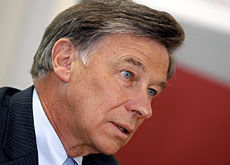
Business federation backs Merz tax reform

The Swiss Business Federation, economiesuisse, has thrown its support behind plans by Finance Minister Hans-Rudolf Merz to lower corporate tax across the board.
The federation also echoed comments made by Merz at the weekend that the planned reforms should be purely in the interests of Switzerland and not a response to European Commission pressure.
The EC has been complaining for nearly two years that the cantonal company tax policy is unfair and detrimental to competition, a charge that the Swiss deny.
Federation president Gerold Bührer said the need to reduce the federal tax burden on businesses had arisen because other European countries had slashed rates over the past ten years.
“We are not surprised by the finance minister’s statement and we fully support his proposals,” Bührer told swissinfo.
“We have lost competitiveness because the European Union has decreased corporate tax from 38 per cent to 30 per cent [since 1996], and we have to catch up. We have gained a big advantage at cantonal level and now there is leeway to act at a federal level.”
The main bone of contention between Switzerland and the EC is the way cantons exempt taxes on company profits generated abroad. Merz has left the issue open, but Bührer insists Switzerland must not cave in to EC demands.
“This has nothing to do with our quarrel with Brussels, it is a separate issue. Switzerland must retain its sovereignty regarding tax policy,” he added.
Rift “exaggerated”
Economiesuisse outlined its main objectives for the year at its annual spring meeting in Zurich on Wednesday.
The lobby group, that represents the interests of all business sectors, has repeated calls to implement a number of economic reforms that would liberalise the domestic market, including the reduction of federal taxes on company profits.
It wants the government to step up efforts to establish free trade agreements with a number of key countries, with the resurrection of talks with the US a priority following their breakdown last year.
The federation also called for education reforms and a shake up of the energy market to take into account increased demand and climate concerns.
Bührer took over as economiesuisse president at the end of last year following a turbulent few months that saw some members threatening to leave the organisation and one carrying out that threat.
The federation slashed its budget and announced reforms after some manufacturing members complained that their interests were being overlooked in favour of the pharmaceutical and finance sectors.
Bührer said the federation would continue to support a ban on parallel imports, a policy decision that sparked the dispute last year, but would also monitor abuses.
“On the one hand this protects innovation, but we also see misuse of this protection. That is something we are ready to look at but we are not ready to change the fundamental system,” he told swissinfo.
“We have seen some differences between our members over certain nuances but not over integral principles. Reports of a rift have been wildly exaggerated.”
swissinfo, Matthew Allen in Zurich
The Swiss Business Federation was created through the merger in 2000 of the Swiss Trade and Industry Association (Vorort) and the economic promotion organisation.
At that time the Swiss Employers’ Association decided to go it alone.
Since its founding, the federation has attracted more than 30 new members, including Microsoft, IBM and the SWX Swiss Exchange.
Last year, economiesuisse had a budget of SFr15 million ($12.24 million).
Economiesuisse will lose two key players this year: director Rudolf Ramsauer and chief economist Rudolf Walser.
Ramsauer will take on a new position with Swiss food giant Nestlé when he leaves the federation at the end of September after nearly seven years as director.
Walser will retire at the same time after serving at the federation since 1982.
He will hand over to Rudolph Minsch, a professor of economics and applied statistics at the University of Applied Sciences in Chur, central Switzerland.

In compliance with the JTI standards
More: SWI swissinfo.ch certified by the Journalism Trust Initiative




























You can find an overview of ongoing debates with our journalists here . Please join us!
If you want to start a conversation about a topic raised in this article or want to report factual errors, email us at english@swissinfo.ch.